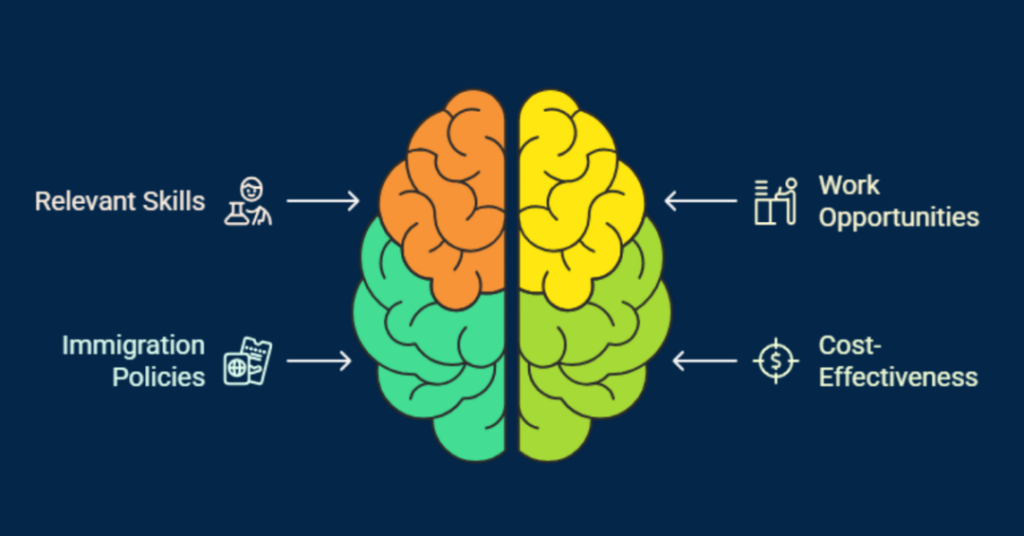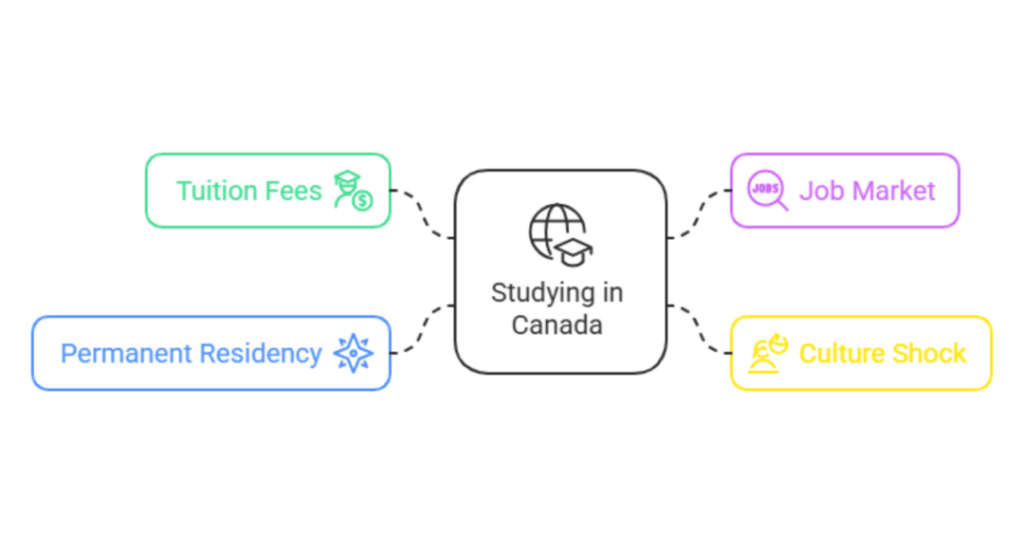25 June 2025
7 minutes read
Is It Worth Studying In Canada For Indian Students? 5 Top Reasons To Study In Canada

Key Takeaways
- Is it worth studying in Canada for Indian students—it absolutely is if you want real opportunities, not just a degree.
- Expect high tuition and tough competition, but also strong returns in salary and career growth.
- Build global connections, gain work experience, and unlock long-term immigration options.
“Don’t just earn a degree. Earn a future.” That’s the unspoken motto driving thousands of Indian students to study in Canada every year. Let’s be real, back home, even toppers struggle with outdated syllabi, minimal research exposure, and a rat race that often leads nowhere. Meanwhile, Canada offers high-quality education, post-study work permits, and a system that actually values your skills.
So if you’re tired of settling for less, studying in Canada might just be the smartest move you’ll ever make.
What Are The Benefits Of Studying In Canada?
“Study abroad” isn’t just a dreamy Instagram caption anymore. For most Indian students, it’s a full-blown escape plan from an education system stuck in the 90s and a job market that asks for experience before giving you one. And while there are dozens of countries waving flags at international students, Canada is one of the few that actually delivers. It doesn’t just hand you a degree; it hands you a future that makes sense—financially, professionally, and even emotionally.

Here’s what makes studying in Canada a move worth considering—and no, it’s not just the maple syrup.
1. Degrees That Don’t Collect Dust—They Open Doors
Canadian universities don’t just hand out paper—they hand out relevant skills. Their education system is built around real-world learning, co-op programs, and work experience that actually gets you hired. Whether your field of study is AI, biotech, or business, the focus is on hands-on learning with direct access to the industries hiring today—not five years ago. That’s a huge win for international students in Canada trying to stand out globally.
2. You Can Work While You Study—Legally and Easily
Most students studying in Canada are stunned by this: you can legally work 20 hours a week during semesters and full-time during breaks—without any extra paperwork. No shady jobs under the table. No stress. That means less dependency on home finances and more actual work experience on your resume. Even better? After graduation, Canada offers a post-study work permit that gives you a head start in building a career abroad.
3. You’re Not Just a “Foreigner”—You’re Part of the Plan
Unlike other countries where international students are seen as cash cows, Canada’s policies are designed to retain talent, not exploit it. If you want to study and stay, the immigration system makes it possible. With a valid study permit, strong work opportunities, and clear PR pathways, Canada offers more than just a temporary experience—it offers long-term growth. That’s rare in the study abroad game.
4. Smart ROI: Lower Cost of Living, Higher Value
Let’s talk numbers. Studying abroad often comes with terrifying tuition and housing bills. But the cost of living in Canada is noticeably lower compared to the US, UK, or Australia—especially in student-friendly cities like Montreal and Calgary. Combine that with a world-class education and accessible scholarships, and you’ve got an ROI that actually checks out. For Indian students balancing dreams and budgets, that matters.
What Are The Cons Of Studying Canada?
Canada is renowned for offering high-quality education and endless opportunities to students—but it’s not Hogwarts. Despite being a top destination for international students, studying in Canada presents challenges that no glossy brochure or YouTube vlog tells you about.

If you’re planning to study in Canada, it’s crucial to look past the polished campus shots and understand the real disadvantages of studying in Canada. Because let’s face it—higher education in Canada is amazing, but it’s not magic. Here are the actual downsides that many students from around the globe, especially students studying in Canada from India, wish they knew before booking that flight.
1. The Tuition Fee in Canada Is No Joke
Sure, education in Canada is cheaper than the US—but that doesn’t make it cheap. The tuition fee in Canada for international students is significantly higher than for domestic students, especially in top universities in Canada. When you add living expenses in Canada, health insurance, and materials, the total cost can rival a down payment on a house. Many international students arrive expecting affordable higher education and end up swimming in debt. And yes, scholarships for international students exist—but competition is brutal.
2. The Job Market Isn’t Always Welcoming
Canada offers post-study work opportunities, but let’s get real: getting a good job isn’t automatic. Many students studying in Canada get stuck in low-wage jobs even after earning a university degree. Your work visa lets you work up to 20 hours a week, but most of those hours go toward rent, not savings. For international students seeking real career paths in their field, job hunting can feel like a second degree. Work in Canada sounds great—until you’re handing out résumés to cafes with a master’s in engineering.
3. Culture Shock Is a Full-Time Thing
Living in Canada isn’t always maple syrup and mountain views. The social dynamics, weather, and lifestyle can feel alien—especially if you’re moving to Canada straight from Indian cities. Loneliness, depression, and identity confusion are common yet rarely discussed. Life in Canada for students from around the globe can be isolating, especially in smaller towns. This isn’t just about cold weather—it’s about missing home, food, and a culture that understands you without subtitles.
4. Permanent Residency Isn’t a Guarantee
Many students choose to study in Canada hoping to eventually migrate to Canada. That’s fair. But the truth? Immigration rules change often, and a study in Canadian universities doesn’t automatically mean you’ll stay in Canada forever. PR quotas, point-based systems, and region-based preferences can slow or block your plans altogether. While there are major benefits of studying in Canada, applying for a university degree does not equal a citizenship shortcut. It’s a marathon, not a free pass.
Is It Worth Studying For International Students In Canada?
It’s a six-figure decision, a gamble with your future, and sometimes, just glorified adulting in a colder postcode. And Canada? Well, it’s not just the polite cousin of the U.S.—it’s become the unofficial capital for international students who want to study without going broke or going unnoticed. But is it really worth it?
Here’s the unsanitized truth: Yes, studying in Canada is worth it—but not for the reasons you’ve been fed by ads or counselors. Let’s talk about what actually makes it worth it for students studying in Canada—the stuff they never put on the brochures.
1. Canada’s Immigration System Actually Wants You to Stay
Unlike countries that see you as a one-time tuition fee, Canada for international students is a long-term deal. If you’re skilled, educated, and job-ready, the country actively builds programs to help you stay. Provincial Nominee Programs (PNPs), Express Entry streams for graduates, and region-specific PR routes aren’t just lip service—they’re working pipelines. It’s one of the few countries where studying there strategically boosts your odds of immigration.
2. Your Degree Doesn’t Expire Outside the Country
One major issue with studying in many countries? The moment you leave, your degree becomes a shiny souvenir. Universities in Canada, on the other hand, are part of a globally respected system—especially in fields like health sciences, computer science, engineering, and sustainability. This means your university degree retains job market value outside Canada, in case you don’t choose to stay in Canada after graduation.
3. You Can Build a Global Network Without Leaving Campus
What many students don’t realize is that Canada’s international student body isn’t just diverse—it’s influential. People from China, Nigeria, Brazil, France, Iran, and every other corner of the world are studying in Canada after 12th or postgrad, bringing unique networks with them. So, while you’re sipping bad coffee in the library, you’re also forming cross-border business connections, startup teams, and future co-founders—without even realizing it.
4. Access to Grants, Fellowships & Funded Research
Forget just tuition waivers—Canada quietly offers some of the best-funded research and graduate fellowships globally, including the Vanier Canada Graduate Scholarships. If you’re into research or innovation, the advantages and disadvantages tilt heavily in your favor. It’s not just about “studying”—it’s about being paid to contribute to real innovation, and often, securing funded opportunities that rival full-time salaries in other countries.
5. You Learn to Survive. And Then Thrive.
No one talks about this enough: life in Canada as a student will force you to adapt, hustle, and level up. You’ll learn budgeting with brutal winters, juggling classes with part-time shifts, mastering visa paperwork, and building LinkedIn clout like a pro. These aren’t just “hardships”—they’re soft skills on steroids. They make you unstoppable. That personal transformation? Worth more than any textbook.
10 Top Universities To Study In Canada
Canada’s top universities consistently rank among the world’s best—Toronto, McGill, UBC, Waterloo, Western and Calgary all make the cut. And for you, just for you – we have curated a list of such universities:
| University | Avg Tuition (CAD/yr) | Avg Graduate Salary (CAD/yr) |
|---|---|---|
| University of Toronto | 31,880 – 121,600 | ~ 95,000 – 222,000 US$ ≈ 127K–296K CAD |
| McGill University | 27,447 – 67,572 | ~ 74,000 US$ ≈ 98K CAD |
| University of British Columbia (UBC) | 9,131 – 74,464 | ~ 150,000 US$ ≈ 198K CAD (MBA/Exec MBA) |
| University of Alberta | 7,604 – 45,482 | ~ 71,000 US$ ≈ 94K CAD |
| University of Waterloo | 10,942 – 75,100 | ~ 88,000 US$ ≈ 116K CAD (PhD/Masters) |
| Western University | 29,656 – 44,767 | ~ 100,000 US$ ≈ 132K CAD (MBA/Doctorate) |
| University of Montréal | 21,786 – 28,727 | (Varies by field—no central data) |
| McMaster University | 5,894 – 76,668 | ~ 51,000 US$ ≈ 67K CAD |
| University of Ottawa | 4,456 – 38,692 | ~ 73,000 US$ ≈ 96K CAD (MBA/Bachelor grads) |
| Queen’s University at Kingston | 5,772 – 105,000 | ~ 61,000 US$ ≈ 80K CAD |
| University of Calgary | 14,878 – 22,500 | ~ 89,000 US$ ≈ 117K CAD |
Conclusion
Canada isn’t for everyone. It’s expensive, it’s cold, and you won’t have your hand held. But if you’re an Indian student who’s tired of the system back home—if you’re looking for education that translates into opportunity—then yes, it’s worth it. Not just for the degree, but for the experience, the growth, and the doors it opens. Canada won’t promise you shortcuts, but it does give you a fair shot. And sometimes, that’s all you really need.
To get into a top Canadian university, you need more than just good grades—you need a game plan. Ambitio’s AI-powered platform and expert consultants guide you through every step, from choosing the right university to securing study permits and work opportunities. No guesswork, no wasted time—just a clear, structured path to studying in Canada. If you’re ready to make studying in Canada a reality, Ambitio is your best bet.
FAQs
Is the quality of education in Canada good?
Yes, Canadian universities are globally renowned for high academic standards and a balanced approach between theory and practical application
Can I study in Canada right after 12th grade?
Yes, you can start your undergraduate studies in Canada immediately after 12th grade, which helps you adapt quickly and gain knowledge early
Is studying in Canada affordable compared to other countries?
Studying in Canada is relatively affordable compared to the US and UK, with lower tuition fees and reasonable living costs
Can international students work while studying in Canada?
Yes, international students can work up to 20 hours per week during study terms and full-time during breaks
Are there opportunities to stay and work in Canada after graduation?
Yes, graduates can apply for a Post-Graduation Work Permit allowing them to work in Canada for up to three years

You can study at top universities worldwide!
Get expert tips and tricks to get into top universities with a free expert session.
Book Your Free 30-Minute Session Now! Book a call now




























